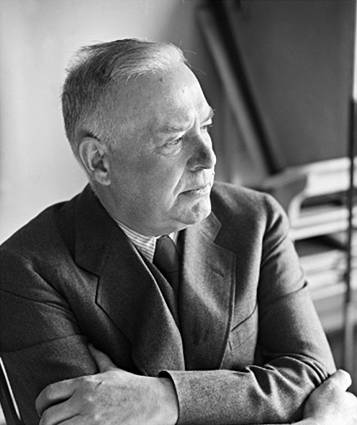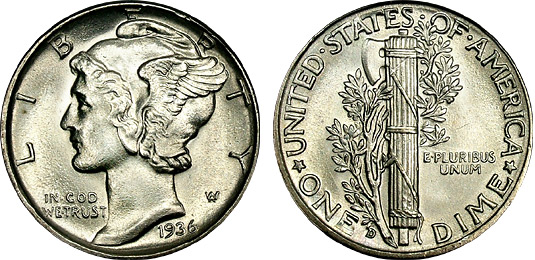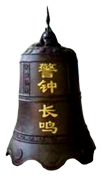American Poet Wallace Stevens (1879-1955)

Wallace Stevens (October 2, 1879 – August 2, 1955) was an American Modernist poet. He was born in Reading, Pennsylvania, educated at Harvard and then New York Law School, and spent most of his life working as a lawyer for an insurance company in Connecticut. His best-known poems include "Anecdote of the Jar," "Disillusionment of Ten O'Clock", "The Emperor of Ice Cream," "The Idea of Order at Key West," "Sunday Morning," "Thirteen Ways of Looking at a Blackbird," and "Tattoo."
Stevens attended Harvard as a non-degree special student, after which he moved to New York City and briefly worked as a journalist. He then attended New York Law School, graduating in 1903. On a trip back to Reading in 1904 Stevens met Elsie Viola Kachel; after a long courtship, he married her in 1909. In 1913, the young couple rented a New York City apartment from sculptor Adolph A. Weinman, who made a bust of Elsie. (Her striking profile was later used on Weinman's 1916-1945 Mercury dime design and possibly for the head of the Walking Liberty Half Dollar.)
After working for several New York law firms from 1904 to 1907, he was hired on January 13, 1908, as a lawyer for the American Bonding Company. By 1914 he had become the vice-president of the New York office of the Equitable Surety Company of St. Louis, Missouri. When this job was abolished as a result of mergers in 1916, he joined the home office of Hartford Accident and Indemnity Company and left New York City to live in Hartford, where he would remain the rest of his life. By 1934, he had been named vice-president of the company. After he won the Pulitzer Prize in 1955, he was offered a faculty position at Harvard but declined since it would have required him to give up his vice-presidency of The Hartford
From 1922 to 1940, Stevens made numerous visits to Key West, Florida, where he generally lodged at the Casa Marina, a hotel on the Atlantic Ocean. He first visited in January 1922, while on a business trip. "The place is a paradise," he wrote to Elsie, "midsummer weather, the sky brilliantly clear and intensely blue, the sea blue and green beyond what you have ever seen." The influence of Key West upon Stevens's poetry is evident in many of the poems published in his first two collections, Harmonium and Ideas of Order. Stevens is a rare example of a poet whose main output came at a fairly advanced age. His first major publication (four poems from a sequence entitled "Phases" in the November 1914 edition of Poetry Magazine) was written at the age of thirty-five, although as an undergraduate at Harvard, Stevens had written poetry and exchanged sonnets with George Santayana, with whom he was close through much of his life. Many of his canonical works were written well after he turned fifty. According to the literary critic Harold Bloom, who called Stevens the "best and most representative" American poet of the time, no Western writer since Sophocles has had such a late flowering of artistic genius. Stevens's first book of poetry, a volume of rococo inventiveness titled Harmonium, was published in 1923. He produced two more major books of poetry during the 1920s and 1930s and three more in the 1940s. He received the National Book Award in 1951 and 1955.
 
|
I placed a jar in Tennessee,
And round it was, upon a hill.
It made the slovenly wilderness
Surround that hill.
The wilderness rose up to it,
And sprawled around, no longer wild.
The jar was round upon the ground
And tall and of a port in air.
It took dominion everywhere.
The jar was gray and bare.
It did not give of bird or bush,
Like nothing else in Tennessee. |
|
Disillusionment of Ten O'Clock
by Wallace Stevens |
|
The houses are haunted
By white night-gowns.
None are green,
Or purple with green rings,
Or green with yellow rings,
Or yellow with blue rings.
None of them are strange,
With socks of lace
And beaded ceintures.
People are not going
To dream of baboons and periwinkles.
Only, here and there, an old sailor,
Drunk and asleep in his boots,
Catches Tigers
In red weather |
|
| |
Thirteen Ways of Looking at a Blackbird
by Wallace Stevens |
|
I
Among twenty snowy mountains,
The only moving thing
Was the eye of the black bird.
II
I was of three minds,
Like a tree
In which there are three blackbirds.
III
The blackbird whirled in the autumn winds.
It was a small part of the pantomime.
IV
A man and a woman
Are one.
A man and a woman and a blackbird
Are one.
V
I do not know which to prefer,
The beauty of inflections
Or the beauty of innuendoes,
The blackbird whistling
Or just after.
VI
Icicles filled the long window
With barbaric glass.
The shadow of the blackbird
Crossed it, to and fro.
The mood
Traced in the shadow
An indecipherable cause.
VII
O thin men of Haddam,
Why do you imagine golden birds?
Do you not see how the blackbird
Walks around the feet
Of the women about you?
VIII
I know noble accents
And lucid, inescapable rhythms;
But I know, too,
That the blackbird is involved
In what I know.
IX
When the blackbird flew out of sight,
It marked the edge
Of one of many circles.
X
At the sight of blackbirds
Flying in a green light,
Even the bawds of euphony
Would cry out sharply.
XI
He rode over Connecticut
In a glass coach.
Once, a fear pierced him,
In that he mistook
The shadow of his equipage
For blackbirds.
XII
The river is moving.
The blackbird must be flying.
XIII
It was evening all afternoon.
It was snowing
And it was going to snow.
The blackbird sat
In the cedar-limbs. |
|
| |
The Idea of Order at Key West
by Wallace Stevens |
|
She sang beyond the genius of the sea.
The water never formed to mind or voice,
Like a body wholly body, fluttering
Its empty sleeves; and yet its mimic motion
Made constant cry, caused constantly a cry,
That was not ours although we understood,
Inhuman, of the veritable ocean.
The sea was not a mask. No more was she.
The song and water were not medleyed sound
Even if what she sang was what she heard,
Since what she sang was uttered word by word.
It may be that in all her phrases stirred
The grinding water and the gasping wind;
But it was she and not the sea we heard.
For she was the maker of the song she sang.
The ever-hooded, tragic-gestured sea
Was merely a place by which she walked to sing.
Whose spirit is this? we said, because we knew
It was the spirit that we sought and knew
That we should ask this often as she sang.
If it was only the dark voice of the sea
That rose, or even colored by many waves;
If it was only the outer voice of sky
And cloud, of the sunken coral water-walled,
However clear, it would have been deep air,
The heaving speech of air, a summer sound
Repeated in a summer without end
And sound alone. But it was more than that,
More even than her voice, and ours, among
The meaningless plungings of water and the wind,
Theatrical distances, bronze shadows heaped
On high horizons, mountainous atmospheres
Of sky and sea.
It was her voice that made
The sky acutest at its vanishing.
She measured to the hour its solitude.
She was the single artificer of the world
In which she sang. And when she sang, the sea,
Whatever self it had, became the self
That was her song, for she was the maker. Then we,
As we beheld her striding there alone,
Knew that there was never a world for her
Except the one she sang and, singing, made.
Ramon Fernandez, tell me, if you know,
Why, when the singing ended and we turned
Toward the town, tell why the glassy lights,
The lights in the fishing boats at anchor there,
As the night descended, tilting in the air,
Mastered the night and portioned out the sea,
Fixing emblazoned zones and fiery poles,
Arranging, deepening, enchanting night.
Oh! Blessed rage for order, pale Ramon,
The maker's rage to order words of sea
Words of the fragrant portals, dimly-starred,
And of ourselves and our origins,
In ghostlier demarcations, keener sounds.
|
|
Of Modern Poetry
by Wallace Stevens |
|
The poem of the mind in the act of finding
What will suffice. It has not always had
To find: the scene was set; it repeated what
Was in the script.
Then the theatre was changed
To something else. Its past was a souvenir.
It has to be living, to learn the speech of the place.
It has to face the men of the time and to meet
The women of the time. It has to think about war
And it has to find what will suffice. It has
To construct a new stage. It has to be on that stage,
And, like an insatiable actor, slowly and
With meditation, speak words that in the ear,
In the delicatest ear of the mind, repeat,
Exactly, that which it wants to hear, at the sound
Of which, an invisible audience listens,
Not to the play, but to itself, expressed
In an emotion as of two people, as of two
Emotions becoming one. The actor is
A metaphysician in the dark, twanging
An instrument, twanging a wiry string that gives
Sounds passing through sudden rightnesses, wholly
Containing the mind, below which it cannot descend,
Beyond which it has no will to rise.
It must
Be the finding of a satisfaction, and may
Be of a man skating, a woman dancing, a woman
Combing. The poem of the act of the mind.
|
|
Tattoo
by Wallace Stevens |
|
The light is like a spider.
It crawls over the water.
It crawls over the edges of the snow.
It crawls under your eyelids
And spreads its webs there--
Its two webs.
The webs of your eyes
Are fastened
To the flesh and bones of you
As to rafters or grass.
There are filaments of your eyes
On the surface of the water
And in the edges of the snow. |
|

1936 Winged Liberty Head (Mercury) dime with the profile image of Stevens's wife, Elsie.
(These coin images are in the public domain.)

Stevens' Hartford residence
(This picture is in the public domain.)

|



